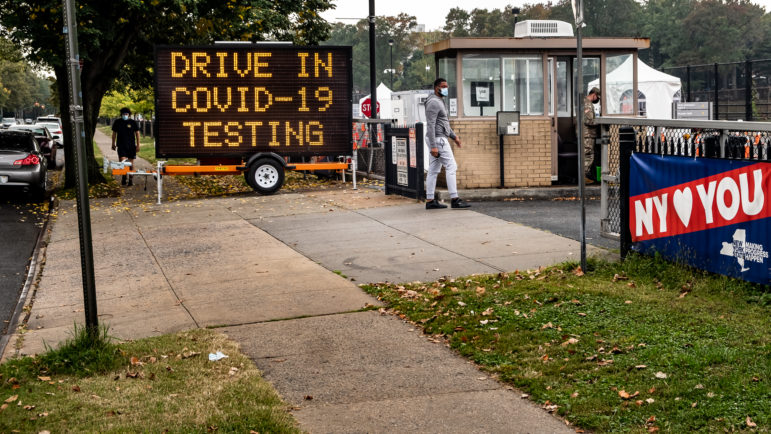‘New York had a child mental health crisis long before COVID-19. It is imperative New York State and New York City make child mental health a priority, especially for the Black and brown children disproportionately devastated by the pandemic.‘

Adi Talwar
A drive through COVID testing site on Goulden Avenue in the Bronx in October. (Adi Talwar)For countless New York City children growing up in the communities hardest hit by COVID-19, the trauma born from the pandemic will stay with them for the rest of their lives. According to a recent study from the Citizens’ Committee for Children, New Yorkers who are Black, Hispanic, or immigrants endured the highest rates of COVID-19-related illness or death.
Meanwhile, Black and Hispanic children experienced loss at twice the rate of Asian or white children. It’s no wonder that the proportion of mental health-related emergency department visits for children ages 5 to 11 increased approximately 24 percent during the pandemic, and for children ages 12 to 17, visits increased 31 percent.
New York had a child mental health crisis long before COVID-19 brought life-altering trauma to hundreds of thousands more families. It is imperative New York State and New York City make child mental health a priority, especially for the Black and brown children disproportionately devastated by the pandemic.
Hispanic families have historically faced a unique set of challenges when it comes to mental health care access due to language barriers and other cultural insensitivities. In August 2020, the CDC released its Youth Risk Behavior Survey, which stated that in 2019 Latina teens in New York City had the highest rate of suicide ideation among their high school peers pre-COVID19. Now, 42 percent of the Latinx community has the highest rate of COVID-related anxiety and depression in comparison to any other ethnic and racial group, and 34 percent of New York City Latinx had the highest mortality rate of any underserved communities, with numbers even higher in the hardest-hit parts in the Bronx. These issues are a result of systemic health and mental health, housing, food security, employment and educational disparities and inequality in resources available during the pandemic.
Comunilife’s Life is Precious™ (LIP) program has been providing suicide prevention services for at-risk Latina teens and their families since 2008. Living in some of New York City’s lowest income, racial and ethnic communities, the LIP families have been disproportionately and severely affected by COVID. For more than 15 months our teens and their families have endured ongoing socio and economic stressors–loss of jobs; food insecurity; loss of family member due to COVID; undocumented status; overcrowded apartments; poor remote education and isolation- resulting in higher levels of hopelessness, anxiety, depression and suicide attempts among the teens and their families.
Despite providing more intensive services, more than a dozen Latina teens have been identified at high-risk of suicide. Further, for the first time in LIP’s history, there have been 18 psychiatric admissions in the last five months. If this were not bad enough, the lack of child and adolescent in-patient psychiatric beds in New York City has led to teens being placed in Westchester County hospitals, where it is difficult for parents to visit and beds in long-term residential facilities almost impossible to find.
While the effects are devastating, we remain hopeful there is a promising path forward given the proven success of the Life is Precious™ program. Prior to the pandemic, the services, which include academic support, expressive arts therapy, health/wellness activities, and family case management, have been successful. Research has shown that for every month a Latina teen participates in Life is Precious™ her level of suicide ideation and depression decreases. For Latina teens with a history of sexual abuse and/or drug and alcohol use, those decreases were more profound. What this tells us is that we know what works–funders just need to support organizations that deliver equitable and quality services to families and children.
The mental health crisis facing Latina teens and the larger Hispanic community will only be fixed with systemic change. The city’s outpatient mental health system lacks sufficient capacity to provide mental health services to a growing population desperately in need of care. New York State must create and support a robust continuum of primary health and behavioral health care for children, adolescents, and their caregivers–offering integrated care in pediatric settings and developmental and behavioral health supports in early care and education and schools.
Further, using New York State-allocated resources from the American Rescue Plan, we must find a way to decrease waitlists at community mental health clinics, adolescent partial hospitalization and increase the number of bilingual and bicultural therapists, but equally as important is to reduce the economic, housing, food insecurity and education factors that exacerbate this COVID-19-related mental health crisis.
New York City cannot recover without its children, and its children cannot heal without access to quality mental health services. The time to act is now.
Dr. Rosa M. Gil is the founder, president and CEO of Comunilife.
The National Suicide Prevention Lifeline provides free and confidential support 24 hours a day, seven days a week and can be reached by calling 1-800-273-8255.








